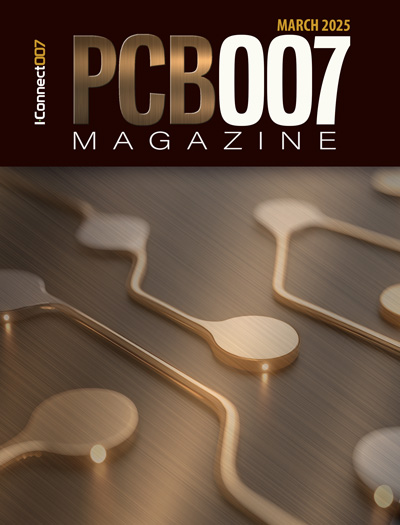-

- News
- Books
Featured Books
- pcb007 Magazine
Latest Issues
Current Issue
Voices of the Industry
We take the pulse of the PCB industry by sharing insights from leading fabricators and suppliers in this month's issue. We've gathered their thoughts on the new U.S. administration, spending, the war in Ukraine, and their most pressing needs. It’s an eye-opening and enlightening look behind the curtain.

The Essential Guide to Surface Finishes
We go back to basics this month with a recount of a little history, and look forward to addressing the many challenges that high density, high frequency, adhesion, SI, and corrosion concerns for harsh environments bring to the fore. We compare and contrast surface finishes by type and application, take a hard look at the many iterations of gold plating, and address palladium as a surface finish.

It's Show Time!
In this month’s issue of PCB007 Magazine we reimagine the possibilities featuring stories all about IPC APEX EXPO 2025—covering what to look forward to, and what you don’t want to miss.
- Articles
- Columns
Search Console
- Links
- Media kit
||| MENU - pcb007 Magazine
Raymond E. Pritchard IPC Hall of Fame Award: Peter Bigelow
April 4, 2025 | Nolan Johnson, I-Connect007Estimated reading time: 6 minutes
IPC’s most prestigious award honors an individual’s long-term distinguished service and contributions to IPC and the electronics manufacturing industry. The award also recognizes the winner’s extraordinary contributions to the advancement of the industry, including creating a spirit of mutual esteem, respect, and recognition among members consistent with IPC’s goals and mission.
Peter Bigelow is president of FTG Circuits in Haverhill, Mass., focusing on the military, RF/microwave, and aerospace markets. He also has extensive experience in general management, marketing, operations, and sales with large publicly traded and privately held manufacturing companies in the printed circuit, electronics, and instrumentation industries. He has been active in the PCB industry for more than 30 years, having served on the IPC Board of Directors for 11 years, has been actively involved with the PCB Management Council and numerous professional development programs and task groups, especially those related to industry compliance challenges and the development of standards that assure trusted suppliers and secure supply chains. He is also a member of the IPC Thought Leaders Program.
Nolan Johnson: Peter, congratulations on receiving IPC’s highest honor. How did you feel when you got the call from John Mitchell?
Peter Bigelow: I was shocked, to be honest. I've been around IPC for a long time and never was one of the tech committee guys who typically receive this award. For a second, and knowing John's sense of humor, I thought he would say something like, “Just kidding.” But he didn’t, and I’m truly honored.
Johnson: How did you get started in this industry and when did you get involved with IPC?
Bigelow: I got into electronics through my work in connectors. That was in 1977, which, by the way, was the first year this award was given out. I had heard of IPC back then, but they didn't have the expo. They had a lot of tech meetings, and our company was active in those meetings. Then, in the early 1990s, I got involved with a print circuit board fabricator in Connecticut. I attended my first IPC meeting in 1994 at the expo at the Heinz Center in Boston.
After that start, I participated every year in various functions. We had a management committee for fabricators at one time, and I chaired that committee and participated in other activities. I got to know a lot of people. In fact, I know most of the Hall of Fame award winners. Many of them are friends, and they've all been inspirations.
Johnson: With your experience, background, and influence, what do you find exciting about our industry right now?
Bigelow: It's an interesting industry, and I love it. I can't think of any other industry where you can have two companies with identical equipment who pop out very different types of products. One might be traditional FR-4, another one is doing flex or rigid-flex, and another firm is doing HDI, yet they’re all using basically the same equipment and the same types of processes.
Conversely, you can have two companies with radically different equipment, located across the world, that are pumping out identical products built to high standards. Why? Because they're using IPC standards to build to. I think that's really neat.
Clearly, when I got involved in the industry, North America was the epicenter. Then it migrated to Asia, but some really exciting things are coming back, and the technology is just amazing. The technology we use today I never could’ve imagined when I started in this industry.
I often share this example with kids to help put it in perspective. “Star Wars” came out during my first year in this industry and it was radically new. We thought, “Wow, this is the future!” If you pay attention, though, C3PO and R2-D2 had to physically plug into the mainframe. There were no portable devices. Yet, within a year of that movie, Apple developed personal computers. That was a game-changer. It’s amazing how technology has changed and evolved, how the electronics industry has been the driver for that, and how IPC has been at the epicenter. I see the future as being really exciting.
Johnson: There has been a lot of change, and not everyone will say those are good changes. What are your thoughts on that?
Bigelow: Sure, some say, “The industry is not what it once was,” and that may be true. There may be fewer companies, but the companies who are here are doing some exciting things. When I entered circuit boards, 7 and 7 was our line and space cutting edge. Now we're looking at HDI, and UHDI is coming. I predict UHDI will be the mainstay in a few years, driven by the demand for denser circuitry. The push to do more in less space will never go away, and as much as people say the circuit boards eventually fade away, I don't think they will, although it may morph into something a little bit different.
It's exciting because the companies producing the products today will be the companies developing the products of the future. How much more exciting can you get than that? Being part of the future, not just part of today.
I'm toward the end of my career and I can talk about technology back when I entered, compared with technology today. I don't think anyone who started in the industry in 1977 could have imagined where we are today.
If you’re new to the industry, I'm here to tell you, “Fasten your seatbelts, it's going to be an exciting run.” Nor is it going to be a linear run. It's going to be exciting to get to the products from another 35 years from now.
Johnson: What would you like your legacy on the Hall of Fame to be?
Bigelow: Oh, that's a great question. I spent a lot of my career in relatively small companies. Even when you’re a relatively small company, you can make a big impact.
The other thing making an impact in the past 20 years has been the compliance requirements, which are so much greater than they once were. Much of that is because of the technology we've developed, which requires a different type of oversight. It's important that IPC be actively involved in those areas, as well as the technical part of the product, because it's in everyone's best interest to have a safe, secure supply chain, one which protects intellectual property and so on.
We must be very diligent about the type of compliance we have to protect intellectual property, to make sure that whatever we do going forward is done fairly and properly, that it takes into consideration the hard work people have put into developing the products and the technology.
Johnson: Peter, any closing thoughts?
Bigelow: I'm truly honored by this. When I was on the board of directors, one of my assignments was with the committee chairman group, listening to the tech guys talk about the challenges and developing standards where they couldn't agree. I got to see the roadblocks they had to work around. I was always in awe of the people who came together, from competing companies or companies with radically different types of product, and yet they were all there to move the industry forward in a positive way. That's what's been exciting for me.
I've stayed so involved over the years because I get to meet those people who are positive builders. They're not looking for reasons not to do something; they're finding ways to do something. That’s really exciting. That attitude is in the DNA of IPC. It's grown a lot since I first got involved. IPC is going in many different areas. It’s on a global path, and yet it's trying to be inclusive, and that’s outstanding. I'm really proud to be part of that.
Suggested Items
Innovative Technology Advancements in Test: HATS² Technology and Its Impact on Reliability Testing
05/13/2025 | Barry Matties, I-Connect007Ensuring the reliability of printed circuit boards (PCBs) has become increasingly difficult and critical, yet the development of advanced testing methodologies is essential to meet-ing industry demands and address-ing persistent challenges. One signif-icant innovation is the High Accelera-tion Thermal Shock (HATS²) test sys-tem, which transforms how reliability testing is conducted. After 40 years in the testing busi-ness at Microtek, Bob Neves is begin-ning a new journey with his company, Reliability Assessment Solutions Inc. (RAS). He has been instrumental in developing the HATS² test system, channeling his decades of expertise into what could be considered the perfect machine.
EWPTE 2025: Wire Processing Innovation Driving Technical Dialogue
05/13/2025 | Brittany Martin, I-Connect007From cutting-edge automation to advanced testing and harness assembly solutions, the 2025 Electrical Wire Processing Technology Expo (EWPTE) delivered a packed exhibit floor, robust technical programming, and valuable peer-to-peer connections.
Beyond the Board: Empowering the Next Generation of Tech Innovators in Electronics
05/13/2025 | Jesse Vaughan -- Column: Beyond the BoardThe electronics industry is at the heart of technological progress, driving innovative advancements that shape our world. Yet, despite the sector's rapid evolution, it faces a looming challenge: attracting and retaining young talent. With an aging workforce and an increasing demand for skilled professionals, the industry must find ways to inspire the next generation of innovators.
Facing the Future: The Role of 5G and Beyond in Shaping PCB Demand
05/13/2025 | Prashant Patel -- Column: Facing the FutureInnovations that push the boundaries of connectivity shape the future of technology, processing power, and miniaturization. 5G and emerging 6G technologies are critical in transforming industries from telecommunications and healthcare to autonomous systems. This affects the printed circuit board (PCB) industry, where demand for high-performance, miniaturized, and advanced PCBs is surging. This column explores the key applications of 5G and beyond, the challenges in designing high-frequency PCBs, the effects of miniaturization, industry collaborations, and opportunities for North American companies in this space.
Barnes Aerospace Appoints George Whittier as CEO
05/12/2025 | BUSINESS WIREBarnes Aerospace, a global provider of component repair services and manufacturer of highly-engineered parts primarily for aeroengines and an operating division of Barnes Group Inc., announced the appointment of George Whittier to the newly created role of CEO, effective May 12, 2025.


